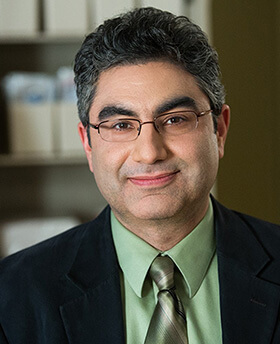February 23, 2022:
 This month, the Big Ten Cancer Research Consortium highlights the Masonic Cancer Center at the University of Minnesota and physician-scientist Emil Lou, MD, PhD, FACP.
This month, the Big Ten Cancer Research Consortium highlights the Masonic Cancer Center at the University of Minnesota and physician-scientist Emil Lou, MD, PhD, FACP.
Investigator Spotlight: Emil Lou, MD, PhD, FACP (@cancerassassin1), Associate Professor in the Department of Medicine, Division of Hematology, Oncology and Transplantation, Department of Medicine and Graduate Faculty Program member in the Integrative Biology and Physiology Program (IBP) at the University of Minnesota; and Medical Director of the UMN Masonic Cancer Center’s Clinical Trials Office (CTO)-Solid Tumor Unit.
Dr. Lou is a physician-scientist with a strong interest in the clinical cancer biology of solid tumors. Dr. Lou’s clinical practice focuses on patients with advanced gastrointestinal cancers, and he is also board-certified in neuro-oncology. His approach to research is to identify gaps in knowledge at the bedside that can be closed using translational oncology and laboratory research. At the national level, Dr. Lou has served on the American Society of Clinical Oncology (ASCO) Scientific Committee for GI Cancers (2012-15), and the Continuing Education Committee for the North American Neuroendocrine Tumor Society (2020-present). Dr. Lou has extensive experience in all facets of leading clinical trials for patients with solid tumor malignancies, and his translational research has focused on identifying predictive molecular biomarkers of success or failure of current and new therapeutics to produce meaningful outcomes for patients with cancer.
The Masonic Cancer Center at the University of Minnesota is a National Cancer Institute-designated Comprehensive Cancer Center and a charter member of the Big Ten Cancer Research Consortium. The Masonic Cancer Clinic serves a large patient population that not only comes to the university for its expertise in Gastrointestinal Oncology and other Solid Tumor Oncology services from the metropolitan Minneapolis-St. Paul area, but also from a large catchment area that includes the entire state of Minnesota as well as eastern North and South Dakota, northern Iowa, and also western Wisconsin. Thus the center has a large referral network, and actively partner with oncologists throughout the state and also in neighboring states to help raise awareness of cutting edge science that it is applying in clinical trials to help patients with cancer. A few examples of this is expanding opportunities in molecular oncology and the emerging space of cellular immunotherapy.
 One of the goals of the cancer center is to grow its program of clinical trials focused on cellular immunotherapy for treatment of patients with solid tumor malignancies by leveraging the strong foundation of expertise in clinical-grade cell manufacturing, stem cell biology, bone marrow transplant clinical excellence, and a growing cadre of discoveries in the cellular and immunotherapy space in the labs at the University of Minnesota. Over the past several years, the center has galvanized all of these resources to create a strong program that has already begun through a cutting edge trial utilizing CRISPR technology to optimize efficacy of adoptive T-cell based cellular therapy for treatment of patients with advanced gastrointestinal cancers [A Study of Metastatic Gastrointestinal Cancers Treated With Tumor Infiltrating Lymphocytes (TIL) in Which the Gene Encoding the Intracellular Immune Checkpoint CISH Is Inhibited Using CRISPR Genetic Engineering.]. This research came out of research laboratories at UMN in collaboration with the National Cancer Institute [Internal checkpoint regulates T cell neoantigen reactivity and susceptibility to PD1 blockade.].
One of the goals of the cancer center is to grow its program of clinical trials focused on cellular immunotherapy for treatment of patients with solid tumor malignancies by leveraging the strong foundation of expertise in clinical-grade cell manufacturing, stem cell biology, bone marrow transplant clinical excellence, and a growing cadre of discoveries in the cellular and immunotherapy space in the labs at the University of Minnesota. Over the past several years, the center has galvanized all of these resources to create a strong program that has already begun through a cutting edge trial utilizing CRISPR technology to optimize efficacy of adoptive T-cell based cellular therapy for treatment of patients with advanced gastrointestinal cancers [A Study of Metastatic Gastrointestinal Cancers Treated With Tumor Infiltrating Lymphocytes (TIL) in Which the Gene Encoding the Intracellular Immune Checkpoint CISH Is Inhibited Using CRISPR Genetic Engineering.]. This research came out of research laboratories at UMN in collaboration with the National Cancer Institute [Internal checkpoint regulates T cell neoantigen reactivity and susceptibility to PD1 blockade.].
The Masonic Cancer Center is working toward further optimization of the TIL armamentarium utilizing highly efficient knockout of intracellular checkpoints with CRISPR technology that leads to improved efficacy and safety. The basic innovation incorporated into this trial is the premise that the novel intracellular immune checkpoint called CISH, which is believed to be a key factor preventing T cells from recognizing and eliminating tumors (cancer checkpoint) via enhancement of neoantigen reactivity. Masonic Cancer Center hopes that this and similarly innovative forms of cell therapy can recapitulate the success that T cell therapies and immuno-oncology therapies have had in liquid tumors and that it will become available to the much larger group of patients with other forms of solid tumors.
Dr. Lou is also the primary investigator PI of a basic science laboratory that focuses on the role of intercellular communication on tumor heterogeneity in a spectrum of invasive and aggressive solid tumor malignancies. Projects in his lab focus on investigating the biology of cancer cells as they relate to cancer cell invasion, progression, tumor recurrence, and chemotherapy resistance. Dr. Lou’s cancer research team’s work has made progress in the role of tumor-stroma cross talk in the complex and heterogeneous tumor microenvironment occurring via tunneling nanotubes (TNTs), long cellular protrusions that act as skyways to create cellular networks for communication and coordination. For examples of confocal and other microscopy videos of this work, click here.
Outside the clinic and lab, Dr. Lou’s cancer research team believes strongly in supporting community initiatives for cancer awareness, advocacy, education, and engagement of the cancer community both locally and nationally. One example was the AACR-sponsored panel at The Atlantic’s People v Cancer event, November 12, 2019, which can be viewed here: Watch the panel.
About the Big Ten Cancer Research Consortium: The Big Ten Cancer Research Consortium was created in 2013 to transform the conduct of cancer research through collaborative, hypothesis-driven, highly translational oncology trials that leverage the scientific and clinical expertise of Big Ten universities. The goal of the Big Ten Cancer Research Consortium is to create a unique team-research culture to drive science rapidly from ideas to new approaches to cancer treatment. Within this innovative environment, today’s research leaders collaborate with and mentor the research leaders of tomorrow with the unified goal of improving the lives of all patients with cancer.
About the Big Ten Conference: The Big Ten Conference is an association of world-class universities whose member institutions share a common mission of research, graduate, professional and undergraduate teaching and public service. Founded in 1896, the Big Ten has sustained a comprehensive set of shared practices and policies that enforce the priority of academics in the lives of students competing in intercollegiate athletics and emphasize the values of integrity, fairness and competitiveness. The broad-based programs of the 14 Big Ten institutions will provide over $200 million in direct financial support to more than 9,800 students for more than 11,000 participation opportunities on 350 teams in 42 different sports. The Big Ten sponsors 28 official conference sports, 14 for men and 14 for women, including the addition of men’s ice hockey and men’s and women’s lacrosse since 2013. For more information, visit www.bigten.org














Subscribe to the Big Ten CRC Newsletter X
X Facebook
Facebook YouTube
YouTube